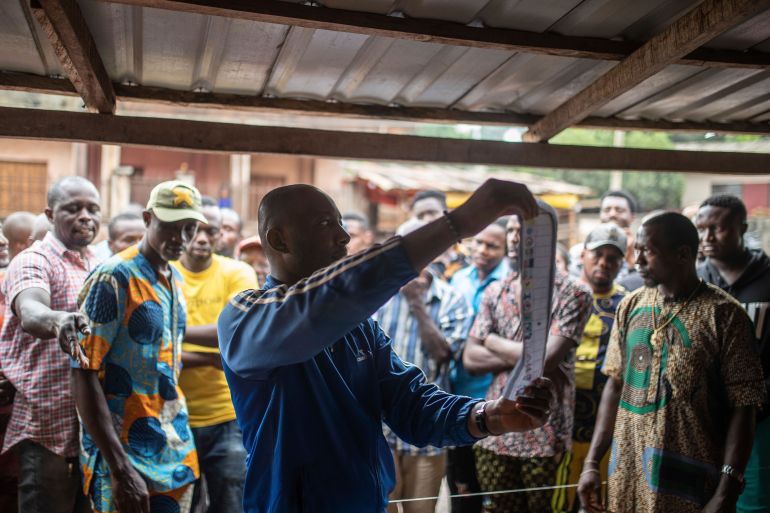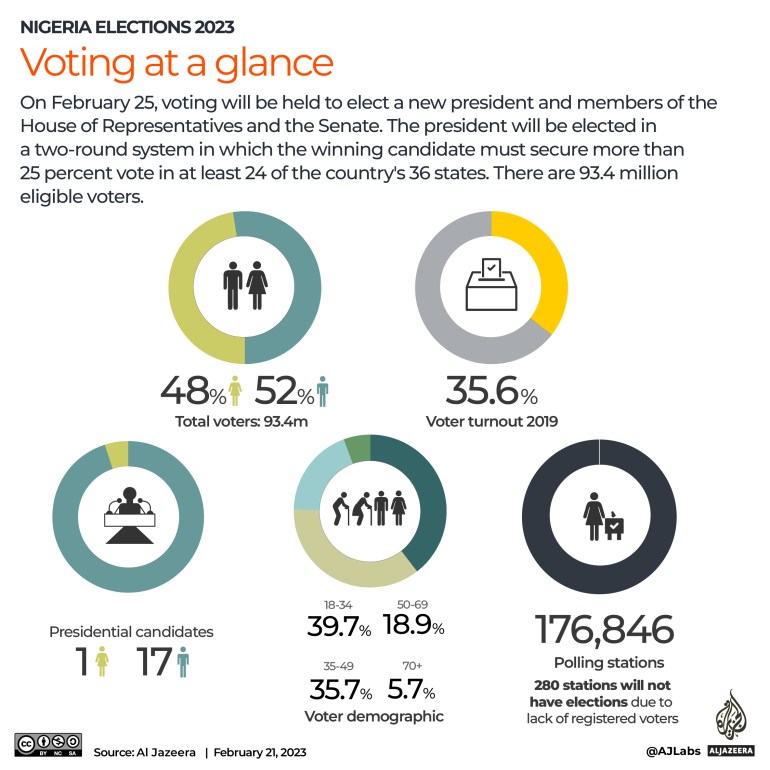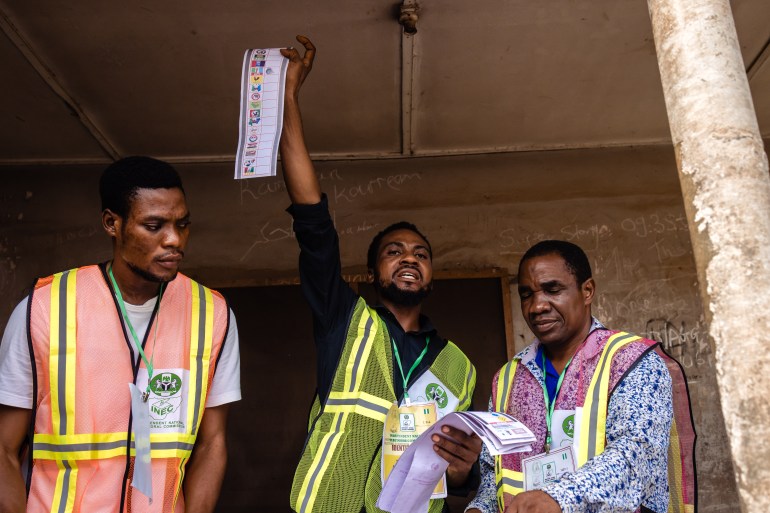Nigeria’s presidential election marked by long delays
Election officials cited technical problems and the absence of voter registers as causes of the delays.

Counting is under way in Nigeria’s tightly contested presidential election, after a poll marked by long delays and gunfire at some voting stations.
The long delays and scattered violence in Africa’s most populous nation on Saturday, however, did not deter large crowds of Nigerians hoping for a reset after years of worsening violence and hardship under outgoing President Muhammadu Buhari.
Keep reading
list of 3 itemsNigeria: Can Peter Obi’s online appeal win enough votes?
Voters, observers hopeful as Nigeria presidential election begins
The electoral commission said the official results could be expected late on Sunday. By the evening, some polling stations were already counting ballots, while voting was still going on at others and had not taken place elsewhere.
Some voting is now expected to take place on Sunday.
Whoever wins will face a litany of crises.
Africa’s biggest democracy is struggling with rebels in the northeast, an epidemic of kidnappings for ransom, conflict between herders and farmers, shortages of cash, fuel and power, as well as deep-rooted corruption and poverty.
The ruling All Progressives Congress (APC) and the outgoing administration have been credited for the ongoing cash and fuel crisis that has paralysed economic activity nationwide. Voters said they were showing their dissatisfaction at the polls.
“Everything that has happened in the past eight years has [been] draining for me,” Oyinkan Daramola, 29, told Al Jazeera. She declined to disclose whom she has voted for out of fear of possible reprisals but hinted at a disdain for the two dominant parties.
This was a common feeling in various locations visited by Al Jazeera across six local government areas in Lagos.
“We cannot keep doing the same thing over and over again and expecting different results,” Daramola said.
Buhari, a retired army general, is stepping down after serving the maximum eight years allowed by the constitution. The main contenders to succeed him are former Lagos governor Bola Tinubu, 70, of the APC, former Vice President Atiku Abubakar, 76, of the main opposition Peoples Democratic Party (PDP), and former Anambra State governor Peter Obi, 61, of the smaller Labour Party.
All three voted in their home states, surrounded by chaotic scrums of reporters and supporters.
Some states were expected to announce results on Sunday, and the final tally from all 36 states plus the federal capital Abuja was expected within five days of voting. National Assembly seats are also on the ballot in this election.
“Polling units in a number of areas closed and sorting and counting of ballot papers have commenced,” Mahmood Yakubu, Independent National Electoral Commission (INEC) chairman, said in a press briefing on Saturday evening.
Voting delays
In Mpape, a largely undeveloped but densely populated district within the capital territory, hundreds of weary voters were seen waiting to cast their votes.
“I’ve been here since 7am today just to vote. I came before the INEC officials even got here, and yet, I’m not ready to leave here until I have voted,” a 45-year-old school teacher, who gave her name only as Patricia, told Al Jazeera at approximately 3pm local time (14:00 GMT). She was one of nearly 700 people waiting to vote.
At 7pm (18:00 GMT), she was still in the queue, waiting her turn.
“I had to go home to feed my family, but I am back now,” she said. She was number 409 on the list of voters standing in the rain to cast their votes.
In Wuye District, a neighbourhood to the west of Abuja city centre, more than 100 people, mostly young, were seen still waiting to vote at nearly 8pm local time (19:00 GMT).
Officials from INEC cited technical problems with a new biometric antifraud voter accreditation system, the late arrival of vehicles to transport them and the absence of voter registers as causes of delays.
“It is frustrating that INEC are not prepared for us. All we want is just to vote,” said Sylvester Iwu, who was among a large crowd waiting at a polling station in Yenagoa, the capital of Bayelsa State in the southern oil-producing Niger Delta.
In a televised news briefing, INEC’s Yakubu said six biometric machines had been stolen in northern Katsina State and two in southern Delta State. He also acknowledged the delays but said voters would be able to cast their ballots.
“The election will hold, and no one will be disenfranchised,” he said.
Yakubu said at a later briefing that voting would take place on Sunday in several wards in Yenagoa that had experienced severe disruption on Saturday.
Morayo Ajayi, a 22-year-old undergraduate student in Akwa Ibom, said she is determined to vote for her candidate no matter how late it got.
“I don’t care if I have to sleep here, but I’m going vote for Peter Obi today,” she said. “Of course, I’ve been waiting for hours, but I don’t mind the wait. I will see this to the end,” she said.
Many youths across Nigeria are supporting the Labour Party’s candidate Peter Obi. Still, the APC’s Bola Tinubu and Atiku Abubakar of the PDP are widely seen as the candidates to beat.

In Elegushi, an affluent area of Lagos, 54-year-old banker Osho Adekunle waited in line for five hours. He is voting for Tinubu because of his “antecedents” in Lagos, a fulcrum on which Tinubu’s supporters based his campaign.
For Adekunle, the 1993 annulled election, which saw Moshood Abiola, a Yoruba like himself and Tinubu, being denied his mandate, inspired his choices there.
“We that know about the history are not voting on sentiment but on practicality,” he said.
Voter frustration
There were reports of scattered violent incidents on Saturday, though not on the scale seen in previous elections in the country of more than 200 million people.
In northeast Borno State, suspected fighters from the Boko Haram group fired mortar shells in the rural Gwoza area, killing one child, wounding four others and disrupting voting, army sources said.
In Abuja, a team from the anti-corruption Economic and Financial Crimes Commission (EFCC) was attacked by thugs just after arresting a man on suspicion of paying for a group of people’s votes using a banking app, the commission said.
In most areas, however, the day appeared to have unfolded peacefully despite frustrations over the delays.

In Aguolu, Obi’s hometown in his native Anambra, voting went smoothly. EFCC officials stopped by to monitor voting there for any possible inducement of voters.
Across parts of Onitsha, Anambra’s commercial capital, and portions of nearby Asaba, the administrative capital of Delta state in the Niger Delta region, many old and young people said they were voting for Obi.
This, despite Delta state Governor Ifeanyi Okowa, an Igbo, being deputy governor on the PDP’s ticket alongside Atiku Abubakar, whom Obi ran with in 2019.
“That’s not my problem, ” Emmanuel Edozie-Uno, a 23-year-old student voting for Obi in Asaba, told Al Jazeera. “I voted for Obi.”
Additional reporting by Ruth Olurounbi, Ope Adetayo, and Eromo Egbejule